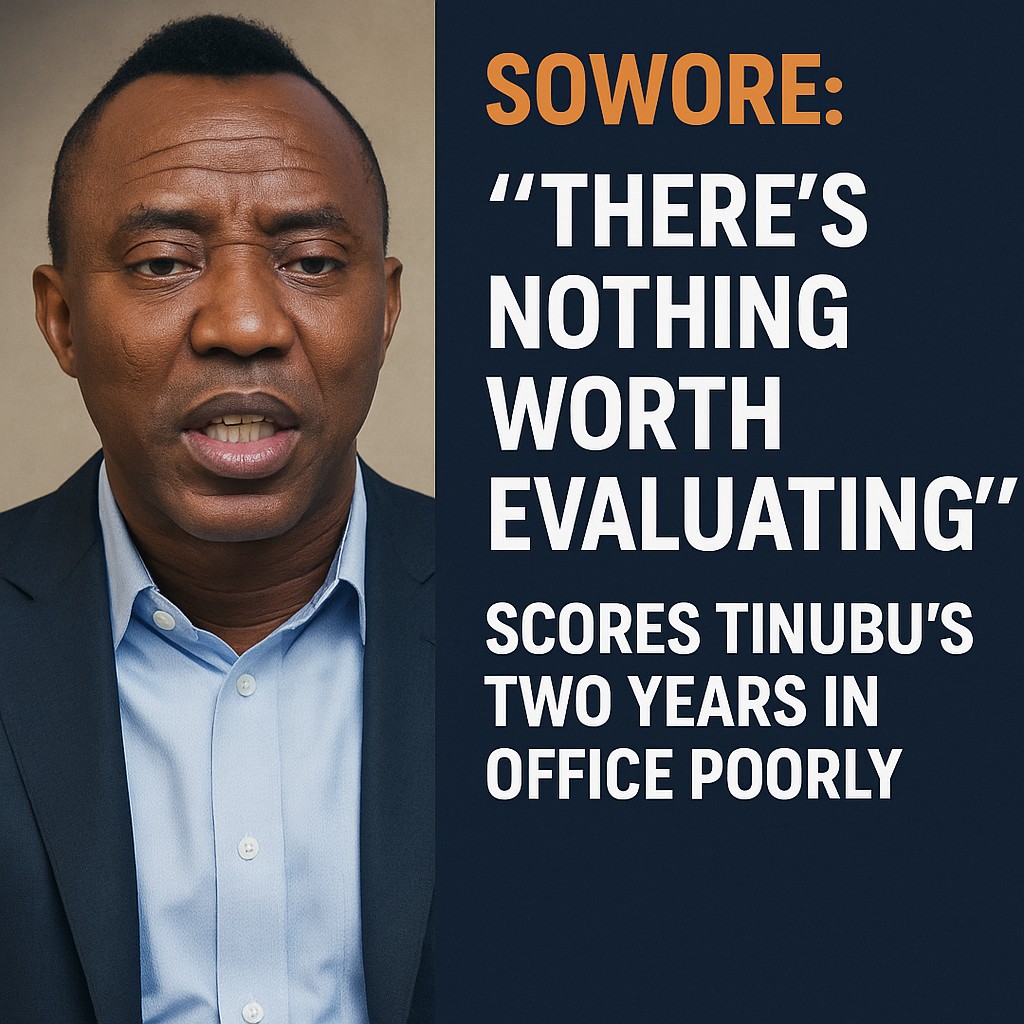
“There’s Nothing Worth Evaluating” — Sowore Blasts Tinubu’s Two Years in Office as a “National Waste”
Omoyele Sowore Delivers Scathing Review of Tinubu’s Presidency: “It’s Been All Hype, No Impact”
Now Two years into President Bola Ahmed Tinubu’s administration, the chorus of criticism is growing louder and at the forefront is activist, publisher, and former presidential candidate Omoyele Sowore, who recently declared that “there’s nothing worth evaluating” in the president’s tenure so far.
In typical fiery fashion, Sowore dismissed Tinubu’s time in Aso Rock as a “complete failure, cloaked in propaganda, policy blunders, and elite protectionism.”
His remarks, made during a press briefing in Lagos and shared widely on social media, have ignited a fierce national debate over what if anything this administration has truly achieved.
Tinubu’s Two Years: Empty Promises or Strategic Patience?
When Tinubu assumed office in 2023, many Nigerians despite skepticism were hopeful. His “Renewed Hope” mantra promised economic revival, energy reform, and a stronger naira. Two years in, those promises have either been postponed, broken, or diluted.
The Harsh Realities Nigerians Are Facing:
- Fuel subsidy removal has led to record-breaking inflation.
- The naira has plunged to historic lows.
- Minimum wage negotiations have stalled while politicians earn bloated salaries.
- Insecurity, despite official denials, still plagues northern and central Nigeria.
- Youth unemployment remains a ticking time bomb.
Sowore, never one to mince words, stated bluntly:
“If you strip away the lies, there’s no policy, no reform, and certainly no leadership. This is a government that celebrates motion without progress.”
ALSO READ
APC Suspends Ex-Rep and Nine Party Officials
2027 Election” Wike’s APC Prediction
2027 election results have been written, democracy is gone
“Economic Reforms” or National Punishment?
Sowore criticized Tinubu’s economic reforms, calling them “IMF-driven experiments that punish the poor while enriching the political elite.” He referenced the removal of fuel subsidies and the unification of exchange rates policies hailed by the West but seen as catastrophic by everyday Nigerians.
“It’s like removing a life jacket from a drowning man and calling it reform,” Sowore added. “They tell us to ‘tighten our belts’ while politicians fly private jets.”
Governance or Godfatherism?
One of Sowore’s most controversial jabs was directed at what he called Tinubu’s “godfather-style governance”, suggesting the president’s real mission is to entrench loyalists in key sectors rather than serve the people.
From ministerial appointments to contract allocations, critics argue that the administration is more focused on rewarding political allies than rebuilding the nation.
“This isn’t governance it’s a cartel in power,” Sowore fumed.
The Opposition Reacts: “Sowore Is Bitter”
While supporters of the administration have dismissed Sowore’s criticisms as “bitterness from a perennial loser,” others say he’s simply voicing what millions of Nigerians feel but are too afraid to say out loud.
A presidential aide reportedly called his statement “unpatriotic and inflammatory,” but offered no direct counterpoint to the allegations of policy failure.
Still, public sentiment appears to lean heavily toward Sowore’s side especially on social platforms where hashtags like #TinubuFailed, #RenewedSuffering, and #SoworeWasRight continue to trend.
What Next for Nigeria?
Sowore’s comments serve as a blunt reality check. Whether one agrees with his tone or not, it’s hard to deny that many Nigerians are disillusioned. They are not just tired — they are angry, hungry, and fast losing faith in a system that seems rigged against them.
As the 2027 elections creep closer, the question now is not just about Tinubu’s performance, but whether the electorate will once again settle for familiar names or finally demand radical, accountable leadership.
Whatsnextng Thoughts: Empty Streets, Empty Stomachs, Empty Promises?
Sowore’s verdict may be controversial, but it forces a necessary conversation: What has truly changed in Nigeria since 2023 for the average citizen, not the politically connected? The sad truth, many believe, is very little.
Until the Nigerian government begins to deliver tangible, inclusive development not just press releases and photo ops critics like Sowore will not only be heard, they’ll be echoed.







